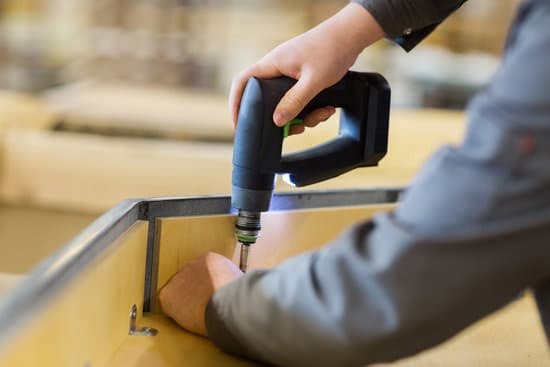Woodwork shops are a hub of creativity and skilled craftsmanship, but they also come with their fair share of risks and hazards. This raises the question: do woodwork shops need liability insurance? Liability insurance is essential for woodwork shops to protect themselves against potential financial and legal repercussions in case of accidents or incidents.
Understanding the importance of liability insurance for woodwork shops begins with recognizing the unique risks and hazards that come with working in this industry. From sharp tools to heavy machinery, there are numerous potential dangers that could result in injury to employees, customers, or damage to property.
It is crucial for woodwork shop owners to have a clear understanding of the different types of liability insurance coverage available to them. Whether it’s general liability, product liability, or professional liability insurance, each type offers specific protections that can safeguard against different scenarios. With proper coverage in place, woodwork shop owners can mitigate the financial burden of legal fees, medical expenses, and compensation for damages that may arise from unforeseen incidents.
As we delve deeper into this article, we will explore the various aspects of liability insurance for woodwork shops, including legal requirements and regulations, tips for managing and mitigating risks, as well as how to find the best liability insurance tailored to the unique needs of your woodwork shop.
Risks and Hazards in Woodwork Shops
Woodwork shops are filled with various risks and hazards that can lead to accidents, injuries, and property damage. Understanding these risks is crucial for woodwork shop owners in order to mitigate them effectively and ensure the safety of their employees and customers.
Common Risks in Woodwork Shops
One of the most common risks in woodwork shops is the use of machinery and tools. Woodworking equipment such as table saws, jointers, planers, routers, and sanders can cause serious injuries if not handled properly. In addition to the use of equipment, slips, trips, and falls are also common hazards in woodwork shops due to sawdust buildup on floors and cluttered work areas.
Hazards to Employees and Customers
Employees working in woodwork shops face the risk of suffering from cuts, amputations, eye injuries, and respiratory problems due to exposure to sawdust and other airborne particles. Meanwhile, customers visiting the shop may also be at risk of injury from mishandled machinery or falling objects.
The Importance of Risk Management
Given these risks and hazards present in woodwork shops, it is crucial for shop owners to prioritize risk management strategies. This includes implementing proper safety protocols, providing adequate training for employees on how to operate machinery safely, maintaining a clean and organized workspace to prevent slips and falls, conducting regular equipment maintenance checks, and ensuring that customers are aware of potential hazards within the shop.
Nonetheless while this is critical it’s also necessary to have liability insurance in place as an additional layer of protection against unforeseen accidents or incidents.
The Importance of Liability Insurance for Woodwork Shops
Woodwork shops are full of potential hazards and risks, making liability insurance a crucial investment for any shop owner. Whether it’s the use of power tools, the handling of large pieces of wood, or the presence of employees and customers in the shop, there are many opportunities for accidents to occur.
In the event that someone is injured or their property is damaged while on your premises or as a result of your work, liability insurance can provide protection and financial coverage.
Risk Management
One of the key reasons why woodwork shops need liability insurance is to effectively manage and mitigate risks. Accidents can happen at any time, despite following strict safety protocols. Liability insurance provides coverage for legal fees, medical expenses, and compensation for damages that may arise from accidents or injuries in your woodwork shop. This type of insurance not only protects you financially but also demonstrates to customers and employees that you take their safety seriously.
Protecting Your Business
Having liability insurance for your woodwork shop also protects your business from potential lawsuits and claims. In today’s litigious society, it only takes one accident for a customer or employee to file a lawsuit against your business. Without liability insurance, the financial repercussions could be devastating and even lead to bankruptcy. By having the right coverage in place, you can rest assured that your business is protected from unforeseen incidents.
Peace of Mind
Finally, investing in liability insurance for your woodwork shop provides peace of mind. Knowing that you are covered in case of accidents or lawsuits allows you to focus on running and growing your business without constantly worrying about potential liabilities. It’s an essential part of being a responsible business owner and ensuring the long-term success of your woodwork shop.
Types of Liability Insurance Coverage for Woodwork Shops
Liability insurance for woodwork shops is a crucial aspect of ensuring the safety and security of the business. This type of insurance provides coverage for legal costs and payouts in the event that a customer or third party suffers injury or property damage as a result of the woodwork shop’s operations. It also covers costs related to medical expenses, legal defense, and settlements.
Risks and Hazards in Woodwork Shops
Woodwork shops are inherently risky environments due to the variety of tools and machinery used, as well as the potential for slips, trips, and falls. Common hazards include saws, drills, sanders, and other power tools that can cause serious injury if not used properly. In addition, there is always a risk of fire due to sawdust accumulation and the use of flammable materials such as varnish and paint.
The Importance of Liability Insurance for Woodwork Shops
Having liability insurance for woodwork shops is essential in protecting the business from unforeseen accidents or incidents that could result in costly lawsuits or claims. Without adequate coverage, the financial burden of legal fees and payouts could potentially bankrupt a woodwork shop. This type of insurance provides peace of mind for both the business owner and their customers, knowing that they are protected in case something goes wrong.
| Aspect | Information |
|---|---|
| Coverage | Legal costs, payouts, medical expenses |
| Risks | Use of power tools, fire hazards |
| Importance | Protection from costly lawsuits or claims |
Factors to Consider When Choosing Liability Insurance for Woodwork Shops
When considering liability insurance for woodwork shops, there are several important factors to take into account. One of the most critical factors is the size and scope of your woodwork shop. Larger operations with more employees and equipment may require higher coverage limits to adequately protect against potential claims. It’s important to assess the specific risks associated with your woodwork shop, such as the use of power tools, handling of heavy materials, and potential exposure to fire hazards.
Another key factor to consider when choosing liability insurance for a woodwork shop is the level of customer interaction. If your shop regularly welcomes clients or customers onto the premises, you may need additional coverage for premises liability in case of accidents or injuries occurring on site. Additionally, if you offer furniture installation or delivery services, it’s important to ensure that your liability insurance includes coverage for these activities as well.
It’s also crucial to assess the financial stability and reputation of the insurance provider. Look for an insurer with a strong track record in providing coverage for woodwork shops and other similar businesses.
Be sure to thoroughly review and compare policy options, including coverage limits, deductibles, exclusions, and endorsements offered by different insurers. By carefully considering these factors, woodwork shop owners can make an informed decision when choosing liability insurance that best suits their individual needs and provides adequate protection against potential risks and liabilities.
In summary, when deciding on liability insurance for a woodwork shop, it is essential to consider aspects such as the size and scope of the operation, customer interaction levels, specific risks associated with woodworking activities, as well as selecting a reputable insurance provider with appropriate policy options. By taking these factors into account during the decision-making process, woodwork shops can secure comprehensive protection against potential liabilities while safeguarding their business operations effectively.
Case Studies
Woodwork shops are not immune to accidents, and when they happen, liability insurance can be a saving grace. Here are some real-life examples of incidents that have occurred at woodwork shops and how liability insurance played a crucial role in mitigating the consequences:
1. Employee injury: In a large-scale woodworking shop, an employee suffered a serious hand injury while operating heavy machinery. The shop was found liable for inadequate safety training and maintenance of equipment. Fortunately, they had liability insurance to cover the medical expenses and lost wages of the injured employee.
2. Property damage: A small woodwork shop experienced a fire due to faulty electrical wiring. The fire caused significant damage to the workshop as well as neighboring properties. Without liability insurance, the shop owner would have been unable to afford the costly repairs and compensation for the affected neighbors.
3. Client dispute: A custom furniture maker was sued by a client who claimed that the finished product did not meet their expectations and caused property damage upon delivery. The woodwork shop’s liability insurance helped cover legal fees and settlement costs, protecting the business from financial ruin.
These case studies highlight the importance of having proper liability insurance for woodwork shops in order to protect against unforeseen circumstances that could potentially bankrupt a business.
Overall, it is clear that having liability insurance is essential for woodwork shops in order to protect themselves from potential financial ruin resulting from accidents or disputes with employees, clients or third parties. It is important to carefully consider the type of coverage needed based on individual risks and operations of a specific woodwork shop.
Additionally, being aware of legal requirements and regulations regarding liability insurance for woodwork shops is crucial in ensuring compliance with local laws.
Legal Requirements and Regulations for Woodwork Shops and Liability Insurance
Woodwork shops, like any other business, are subject to legal requirements and regulations when it comes to liability insurance. In many cases, having liability insurance is not only a smart business decision but also a legal requirement. Woodwork shops need liability insurance to protect themselves from potential lawsuits and financial loss in case of accidents or property damage.
One of the main reasons why woodwork shops need liability insurance is to cover the costs of legal defense and settlements in case they are sued for negligence or damages caused by their products or services. Without liability insurance, woodwork shops could be at risk of bankruptcy if faced with a large lawsuit. Additionally, liability insurance can provide coverage for medical expenses and lost wages if someone is injured on the woodwork shop’s premises.
Furthermore, woodwork shops may also be required to have liability insurance in order to operate legally. For example, landlords may require proof of liability insurance as a condition of lease agreements, and local government regulations may also mandate that businesses carry certain types and amounts of liability coverage. By complying with these legal requirements, woodwork shops can avoid potential fines and penalties for operating without proper insurance coverage.
| Reasons for Liability Insurance | Legal Requirements |
|---|---|
| Cover costs of legal defense and settlements | Required by landlords and local government regulations |
| Provide coverage for medical expenses and lost wages | Necessary for operating legally |
How to Find the Best Liability Insurance for Your Woodwork Shop
When it comes to finding the best liability insurance for your woodwork shop, it’s essential to consider several factors to ensure that you have the right coverage for your needs. Here are some tips on how to find the best liability insurance for your woodwork shop:
1. Research Different Insurance Providers: Take the time to research and compare different insurance providers that offer liability insurance for woodwork shops. Look for companies with experience in insuring businesses in the woodworking industry and check their ratings and customer reviews.
2. Understand Your Specific Risks: Every woodwork shop is unique, so it’s crucial to understand the specific risks associated with your business. Consider factors such as the size of your shop, the type of work you do, the equipment you use, and the number of employees you have. This will help you determine the type and amount of coverage you need.
3. Consult with an Insurance Agent: It can be beneficial to consult with an experienced insurance agent who understands the woodworking industry. They can help assess your risks, explain different policy options, and assist you in finding a customized liability insurance plan that meets your specific needs.
By following these tips, you can find the best liability insurance for your woodwork shop and ensure that you are adequately protected against potential risks and liabilities.
Tips for Managing and Mitigating Risks in Woodwork Shops
Woodwork shops are inherently filled with risks and hazards due to the nature of the work involved. From heavy machinery and power tools to sharp objects and wood dust, there are various factors that can pose a threat to the safety of employees, customers, and even passersby. As a result, it is crucial for woodwork shops to have proper liability insurance in place to protect themselves from potential legal and financial repercussions.
One of the key ways to manage and mitigate risks in woodwork shops is by having comprehensive safety protocols in place. This includes providing adequate training for employees on how to use equipment safely, implementing regular inspections for machinery and tools, as well as enforcing strict safety guidelines within the shop. By prioritizing safety measures, woodwork shops can significantly reduce the likelihood of accidents and injuries occurring on their premises.
Another important tip for managing risks in woodwork shops is to conduct thorough risk assessments on a regular basis. This involves identifying potential hazards in the shop environment, evaluating the level of risk associated with each hazard, and implementing control measures to minimize or eliminate those risks. By staying proactive in identifying and addressing potential safety concerns, woodwork shops can create a safer working environment for everyone involved.
In addition to safety protocols and risk assessments, it is also advisable for woodwork shops to invest in proper protective gear for employees. This may include items such as goggles, gloves, ear protection, and respirators to safeguard workers from potential dangers associated with woodworking activities. By providing employees with the necessary protective equipment, woodwork shops can further reduce the likelihood of workplace accidents and injuries while demonstrating a commitment to employee welfare.
Conclusion
In conclusion, it is clear that liability insurance is absolutely essential for woodwork shops. The risks and hazards present in these types of environments make it crucial for shop owners to have adequate coverage to protect themselves, their employees, and their customers.
From the potential for accidents involving power tools or machinery to the risk of fire or property damage, woodwork shops face numerous liabilities on a daily basis. Without the right insurance in place, a single incident could result in devastating financial and legal consequences.
As discussed, there are various types of liability insurance coverage available for woodwork shops, including general liability, product liability, and commercial property insurance. Each type of coverage serves a specific purpose in protecting against different potential risks. It is important for shop owners to carefully consider their specific needs and consult with an experienced insurance provider to determine the best combination of coverage for their business.
Furthermore, legal requirements and regulations regarding liability insurance for woodwork shops vary by location. It is crucial for shop owners to be aware of these requirements and ensure they are in compliance with all applicable laws. Ultimately, investing in comprehensive liability insurance is not only a smart business decision but also a necessary one to protect the future of any woodwork shop.
So, do woodwork shops need liability insurance? Absolutely. It’s essential for safeguarding against unforeseen circumstances and ensuring the longevity of the business.
Frequently Asked Questions
Do You Need Insurance for a Woodworking Business?
Yes, insurance for a woodworking business is crucial. It can help protect against property damage, bodily injury, and other liabilities that may arise from the woodworking activities. This can include coverage for tools and equipment, as well as protection in case of fire or theft.
What Does Product Liability Insurance Not Cover?
Product liability insurance typically does not cover intentional acts, contract disputes, or professional errors. It also may not cover damage to your own product or any financial loss due to defect repair or replacement. Additionally, it may not cover punitive damages in case of negligence.
Who Should Have Product Liability Insurance?
Anyone involved in manufacturing, distributing, or selling products should have product liability insurance. This includes businesses that produce goods such as toys, electronics, clothing, food items, and more. Even small businesses and independent contractors should consider this type of coverage to protect against potential lawsuits related to their products.

Hi everyone! I’m a woodworker and blogger, and this is my woodworking blog. In my blog, I share tips and tricks for woodworkers of all skill levels, as well as project ideas that you can try yourself.





